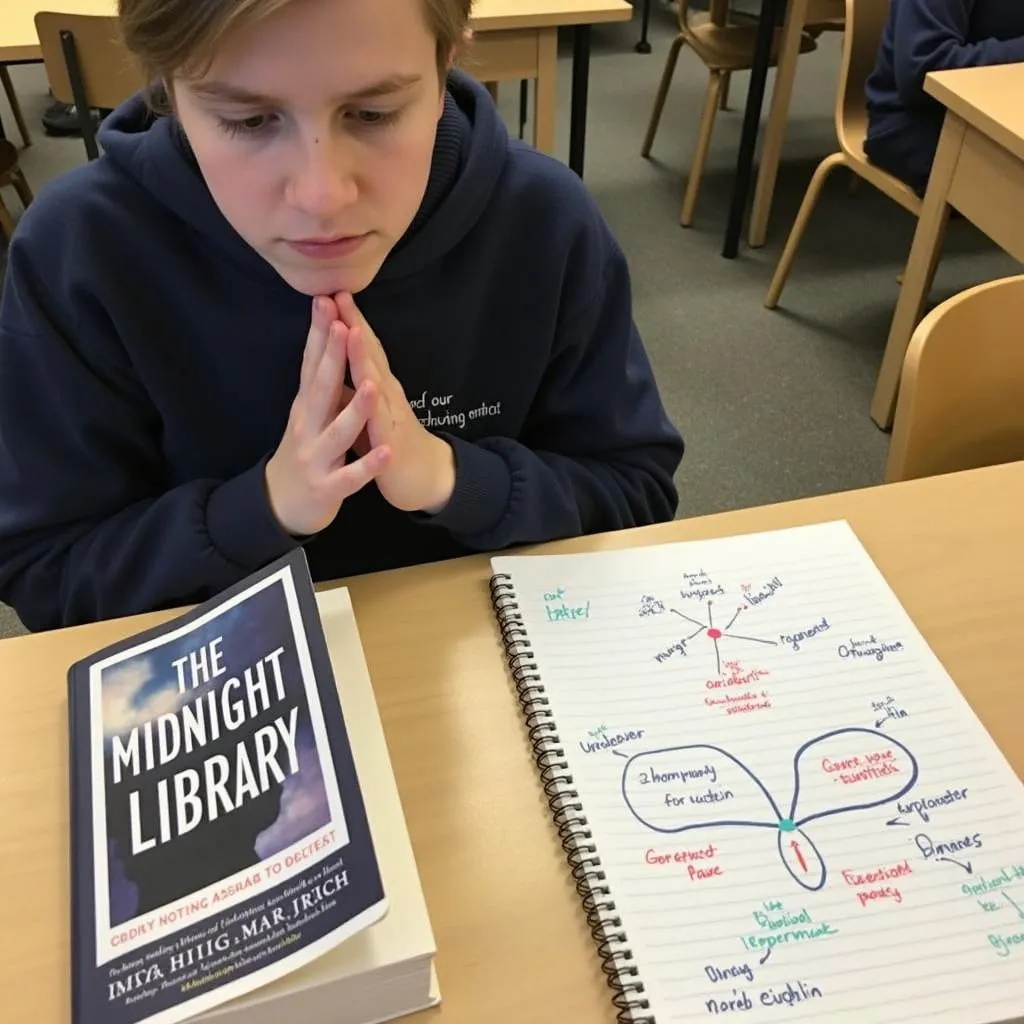The IELTS Speaking test often includes questions about personal experiences, and one common topic is describing a time when you found it difficult to concentrate. This subject has appeared frequently in past exams and is likely to remain relevant in future tests. Let’s explore how to effectively answer questions related to this topic and maximize your score.
Nội dung bài viết
Describe a memorable weekend you had recently can be another interesting topic to practice for your IELTS Speaking test. However, let’s focus on the concentration theme for now.
Part 1: Introduction and Interview
In this section, the examiner may ask questions like:
- Do you find it easy to concentrate?
- What do you do to help you concentrate?
- When do you need to be most concentrated?
Let’s look at a sample answer for the first question:
Examiner: Do you find it easy to concentrate?
Sample answer (Band 7-8):
“Well, it really depends on the situation. Generally, I’d say I have a fairly good ability to focus, especially when I’m working on tasks that I find engaging or challenging. However, like most people, I can struggle with concentration at times, particularly if I’m tired or if there are a lot of distractions around me. I’ve found that creating the right environment and using certain techniques can really help me maintain my focus when I need to.”
Key features:
- Uses a range of vocabulary related to concentration
- Provides a balanced answer, showing awareness of different situations
- Includes personal examples
- Uses complex sentence structures
Part 2: Long Turn
Here’s a sample cue card related to the topic:
Describe a time when you found it hard to concentrate
You should say:
- When and where it happened
- What you were trying to do
- Why it was difficult to concentrate
- How you dealt with the situationSample answer (Band 8-9):
“I’d like to talk about a time when I found it particularly challenging to concentrate. This incident occurred about six months ago when I was preparing for an important presentation at work. I was at home, trying to finalize my slides and rehearse my speech, but focusing proved to be an incredibly daunting task that day.
The main reason for my lack of concentration was the unprecedented level of noise pollution in my neighborhood. A construction project had just begun on the street right outside my apartment, and the constant drilling, hammering, and shouting were incredibly disruptive. To make matters worse, I was already feeling quite anxious about the presentation, which only exacerbated my inability to focus.
Initially, I tried to power through and ignore the noise, but it quickly became apparent that this approach wasn’t working. I realized I needed to take a more proactive stance to overcome this challenge. First, I decided to employ some noise-cancelling techniques. I closed all the windows, drew the curtains, and put on my noise-cancelling headphones. I also played some soft background music to help mask any remaining external sounds.
Next, I implemented a focused work strategy. I broke my task into smaller, more manageable chunks and set specific time limits for each section. This helped me to maintain my concentration for shorter periods, which was much more achievable given the circumstances. I also incorporated regular short breaks into my schedule, using these moments to stretch, practice some deep breathing exercises, and reset my mind.
Perhaps most importantly, I adjusted my mindset. Instead of allowing myself to become frustrated by the noise and my initial lack of progress, I chose to view the situation as a challenge to overcome. This shift in perspective helped me to stay motivated and even gave me a sense of accomplishment as I gradually made headway despite the difficult conditions.
By the end of the day, I had successfully completed my preparation, and the presentation went well. This experience taught me a valuable lesson about the importance of adaptability and resilience when faced with unexpected obstacles to concentration.”
Key features:
- Detailed description of the situation
- Clear structure following the cue card prompts
- Wide range of vocabulary related to concentration and problem-solving
- Use of complex sentence structures and idiomatic expressions
- Reflection on the experience and lessons learned
 Concentration challenges due to construction noise
Concentration challenges due to construction noise
Follow-up questions:
- How do you usually deal with distractions when you need to concentrate?
- Do you think modern technology helps or hinders concentration?
Sample answer for question 1 (Band 8-9):
“I’ve developed several strategies to combat distractions and maintain focus. Firstly, I’m a firm believer in creating an optimal work environment. This often involves finding a quiet space, ensuring good lighting, and removing potential distractions like my phone or unnecessary browser tabs. I also frequently use the Pomodoro Technique, which involves working in focused 25-minute intervals followed by short breaks. This method helps me maintain high levels of concentration for extended periods. Additionally, I’ve found that mindfulness practices, such as brief meditation sessions or deep breathing exercises, can significantly enhance my ability to refocus when my mind starts to wander.”
Part 3: Two-way Discussion
Examiner: Do you think the ability to concentrate is becoming more challenging in modern society?
Sample answer (Band 8-9):
“That’s an intriguing question, and I believe the answer is yes, maintaining concentration is indeed becoming more challenging in our modern world. There are several factors contributing to this phenomenon.
Firstly, we’re living in an age of information overload. With the internet and social media, we’re constantly bombarded with notifications, updates, and new information, which can be incredibly distracting. Our brains are often in a state of continuous partial attention, trying to process multiple streams of information simultaneously.
Moreover, the rise of multitasking as a valued skill in many workplaces has, paradoxically, made it harder for people to focus deeply on a single task. Research has shown that frequent task-switching can actually reduce productivity and impair cognitive function.
Another factor is the increasing pace of life in many societies. There’s often a pressure to be constantly busy and productive, which can lead to stress and anxiety – both of which are detrimental to concentration.
However, it’s not all doom and gloom. I think there’s a growing awareness of these challenges, which has led to the development of various techniques and technologies designed to enhance focus. Mindfulness and meditation practices are gaining popularity, and there are numerous apps and tools designed to block distractions and promote concentrated work.
In conclusion, while modern society does present unique challenges to concentration, I believe that with awareness and the right strategies, it’s possible to cultivate and maintain the ability to focus deeply.”
Key features:
- Provides a balanced and thoughtful response
- Uses a range of advanced vocabulary and phrases related to concentration and modern society
- Structures the answer logically, presenting different aspects of the issue
- Includes examples and explanations to support the points made
- Concludes with a summary that ties the ideas together
 Modern distractions affecting concentration
Modern distractions affecting concentration
Key Vocabulary and Phrases for High Scores
-
Unprecedented /ʌnˈpresɪdentɪd/ (adj): Never known or done before
Example: The unprecedented level of noise made it impossible to focus. -
Exacerbate /ɪɡˈzæsəbeɪt/ (v): Make a problem or bad situation worse
Example: The stress exacerbated my inability to concentrate. -
Proactive /prəʊˈæktɪv/ (adj): Creating or controlling a situation rather than just responding to it
Example: I decided to take a proactive approach to improve my concentration. -
Implement /ˈɪmplɪment/ (v): Put a plan or system into action
Example: I implemented a new study strategy to enhance my focus. -
Adaptability /əˌdæptəˈbɪləti/ (n): The quality of being able to adjust to new conditions
Example: This experience taught me the importance of adaptability in challenging situations. -
Combat /ˈkɒmbæt/ (v): Take action to reduce or prevent something bad
Example: I use various techniques to combat distractions when studying. -
Mindfulness /ˈmaɪndfəlnəs/ (n): The practice of being aware of your thoughts, feelings, and surroundings
Example: Practicing mindfulness has significantly improved my ability to concentrate. -
Information overload (phrase): Exposure to too much information or data
Example: In this digital age, information overload is a common cause of poor concentration. -
Continuous partial attention (phrase): Constantly dividing one’s attention between multiple sources of information
Example: Many people struggle with continuous partial attention due to the constant influx of notifications and updates. -
Cultivate /ˈkʌltɪveɪt/ (v): Try to acquire or develop a quality or skill
Example: It’s important to cultivate good concentration skills from an early age.
Describe a peaceful place in the countryside you have visited could be an excellent topic to practice using some of this vocabulary in a different context.
Examiner’s Advice
To achieve a high score in the IELTS Speaking test when discussing concentration:
-
Use a range of vocabulary: Incorporate advanced words and phrases related to concentration, distractions, and problem-solving.
-
Provide detailed examples: When describing your experience, include specific details about the situation, your feelings, and your actions.
-
Show reflection: Demonstrate your ability to analyze the experience and draw insights or lessons from it.
-
Use a variety of grammatical structures: Incorporate complex sentences, conditionals, and different tenses to showcase your language proficiency.
-
Maintain fluency: Practice speaking on this topic to improve your ability to discuss it smoothly and confidently.
-
Engage with the questions: Listen carefully to the examiner’s questions and provide relevant, thoughtful responses.
-
Develop your ideas: Don’t just give short answers. Expand on your points and provide explanations or justifications for your opinions.
Remember, the key to success in the IELTS Speaking test is practice. Regularly discussing topics like concentration difficulties will help you become more comfortable and articulate during the actual test.
Describe a memorable experience you had in the countryside can be another great topic to practice these skills in a different context.


